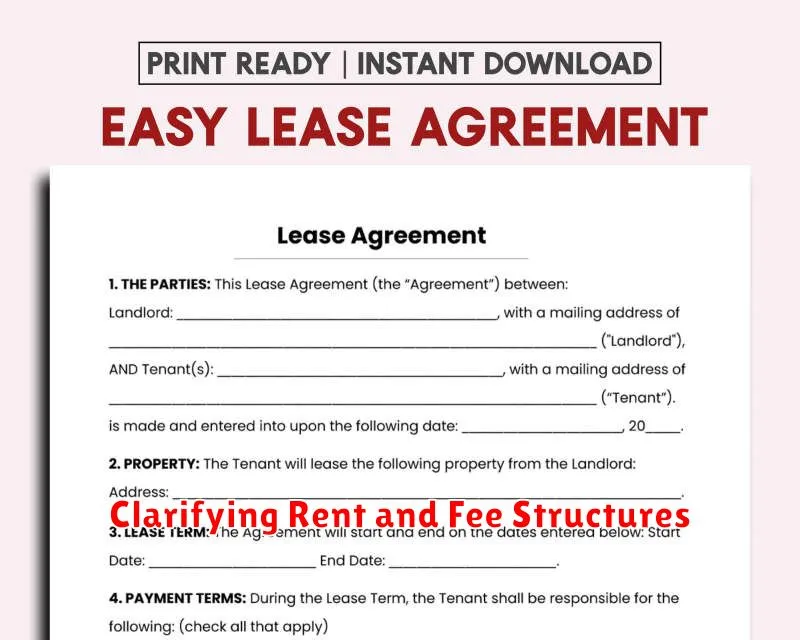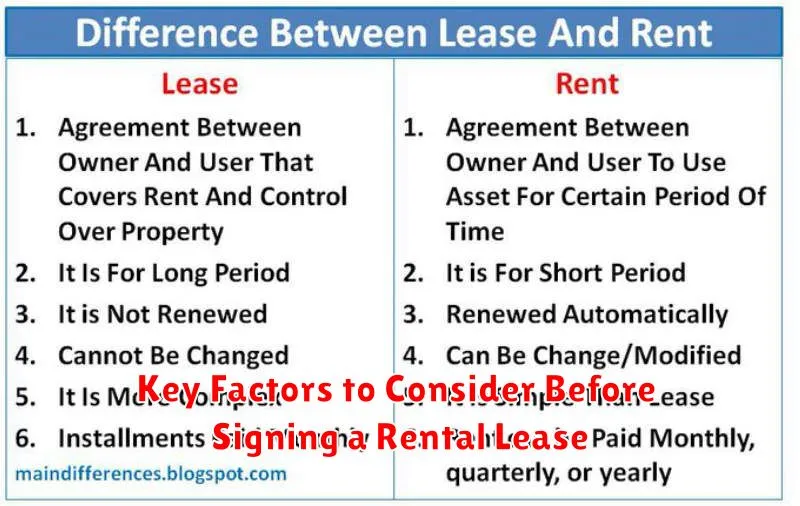Signing a rental lease is a significant commitment, binding you to a specific property and its terms for a designated period. Before you put your signature on that dotted line, it’s crucial to carefully consider several key factors. Understanding these elements will empower you to make an informed decision, ensuring the chosen property truly aligns with your needs and budget, ultimately contributing to a positive rental experience. This article will explore the essential factors you should evaluate before signing a rental lease, helping you navigate the process with confidence and avoid potential pitfalls.
From understanding the lease terms and rental costs to assessing the property’s condition and neighborhood, due diligence is essential. We’ll delve into crucial aspects such as pet policies, parking availability, and lease duration, providing you with a comprehensive checklist to guide your decision-making process. By taking the time to thoroughly examine these key factors before signing a rental lease, you’ll be well-equipped to secure a comfortable and suitable living arrangement, minimizing the risk of future complications or regrets.
Understanding Lease Duration
Lease duration is a critical aspect of a rental agreement. It specifies the length of time you are legally bound to the terms of the lease. Common lease terms are typically 6 months, 1 year, or sometimes even 2 years.
A shorter-term lease offers flexibility, allowing you to relocate more easily. However, it may come with the possibility of rent increases at the end of the term.
A longer-term lease provides stability and predictable housing costs for a set period. However, breaking a long-term lease early can be challenging and may involve penalties.
Carefully consider your circumstances and future plans before deciding on a lease duration. It’s essential to choose a term that aligns with your needs and provides the right balance between flexibility and stability.
Clarifying Rent and Fee Structures

Before signing a lease, thoroughly understand the rent and associated fees. Rent is the periodic payment for the use of the property. Be clear on the amount, due date, and accepted payment methods.
In addition to rent, inquire about other potential costs. These can include application fees, security deposits, parking fees, pet fees, or utilities. Clearly understand what each fee covers and if it’s refundable. A detailed breakdown of these costs should be provided in writing.
Reviewing Rules and Restrictions
Before signing a lease, carefully review all rules and restrictions outlined in the document. These can significantly impact your tenancy and quality of life.
Common restrictions include limitations on pets, guests, and alterations to the property. Pay close attention to clauses regarding noise levels, parking regulations, and the use of common areas. Understanding these rules upfront will help avoid potential conflicts with your landlord and other tenants.
Thoroughly examine the lease for any unusual or unclear restrictions. If anything seems ambiguous, seek clarification from the landlord or a legal professional before signing. Ensure you are comfortable abiding by all stipulated rules and restrictions for the duration of the lease term.
Inspecting the Property Thoroughly
Before signing any lease agreement, a thorough inspection of the property is crucial. This allows you to verify the condition of the unit and ensure it meets your expectations.
Pay close attention to the functionality of appliances, plumbing, and electrical systems. Look for any signs of damage, such as water stains, mold, or pest infestations. Document any existing issues with photographs or written notes. This documentation will be valuable if disputes arise later.
Confirm that the property’s advertised features match reality. For instance, verify the existence and condition of promised amenities like laundry facilities or parking spaces.
Discussing Renewal Terms Clearly
Before signing your initial lease, understand the renewal process. Is it automatic? Does the lease convert to month-to-month? Knowing this upfront helps avoid surprises later.
Negotiate renewal terms before the initial lease expires. This gives you leverage and time to explore other options if necessary.
Clarify any potential rent increases. What percentage is typical? Are there caps in place? Put everything in writing to ensure both parties are on the same page.
Knowing Your Rights as a Tenant
Before signing a lease, it’s crucial to understand your rights as a tenant. These rights vary by jurisdiction, so research your local laws. Familiarize yourself with regulations regarding rent increases, lease terminations, and required notices.
Key areas to investigate include your right to a habitable dwelling, protection against discrimination, and the process for handling security deposits. Knowing your rights empowers you to negotiate effectively and ensures you’re protected throughout your tenancy.

